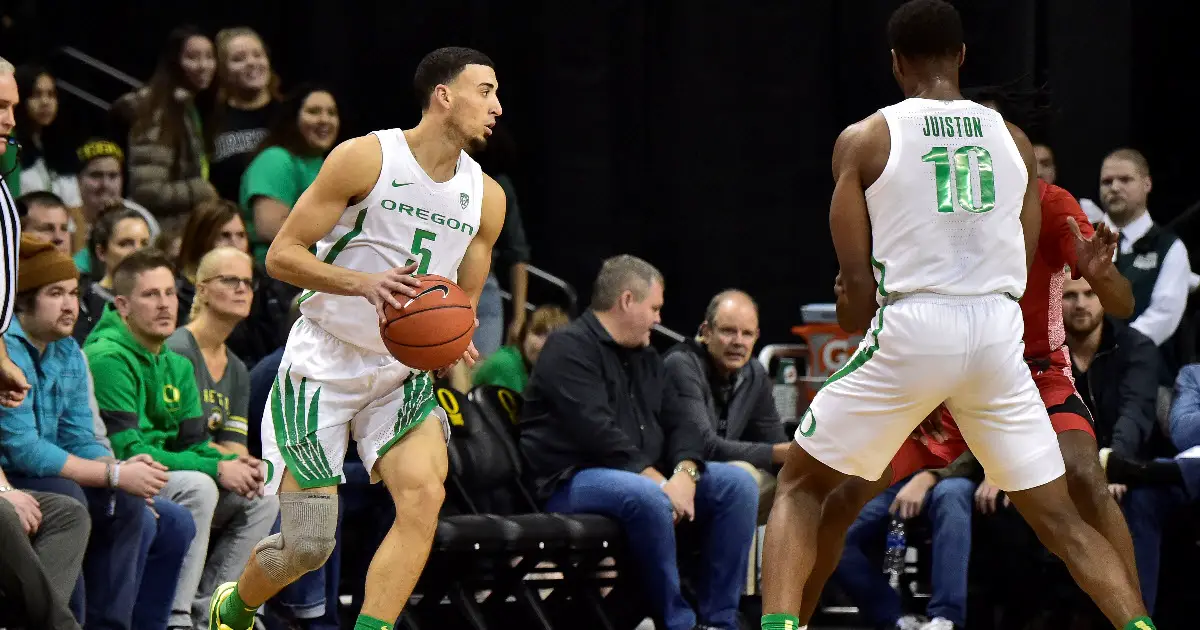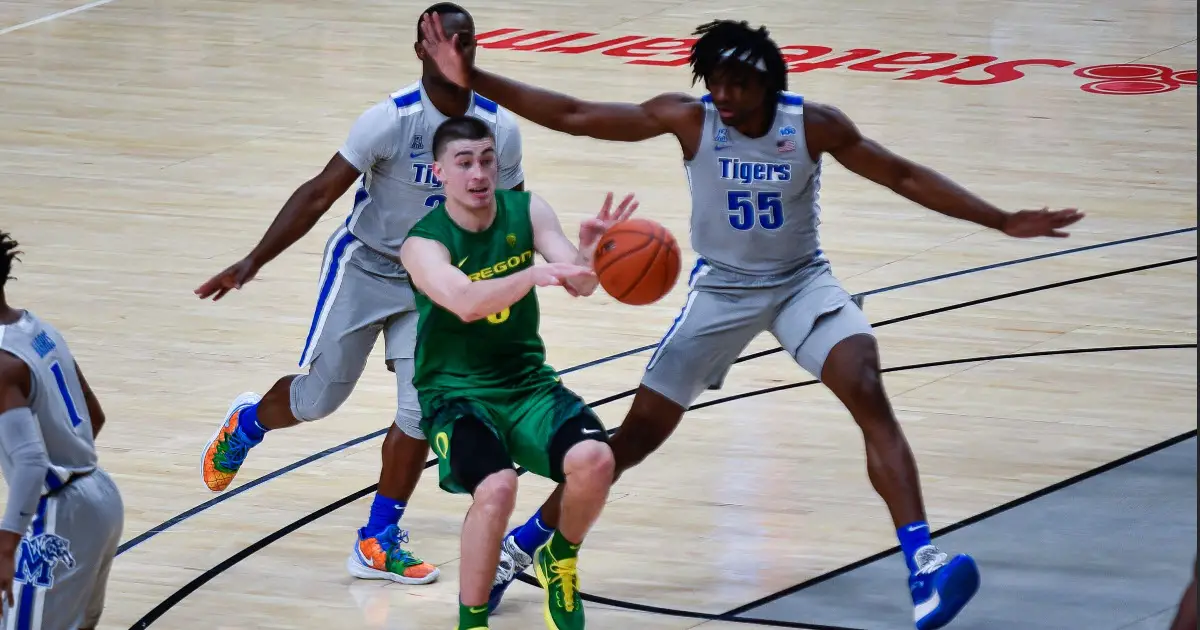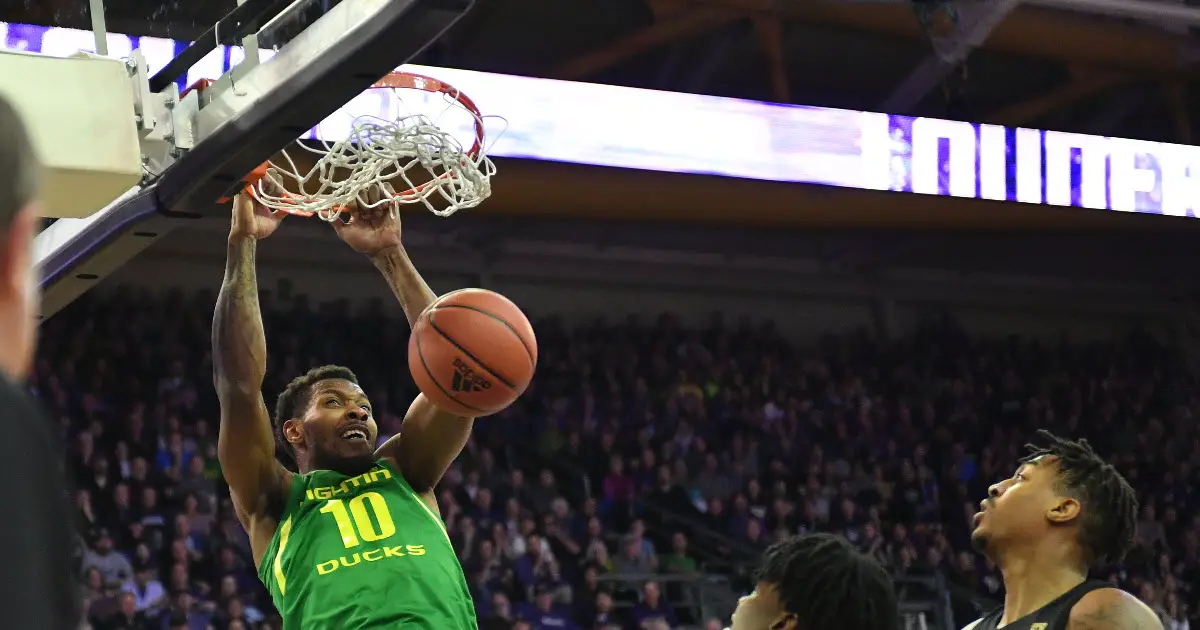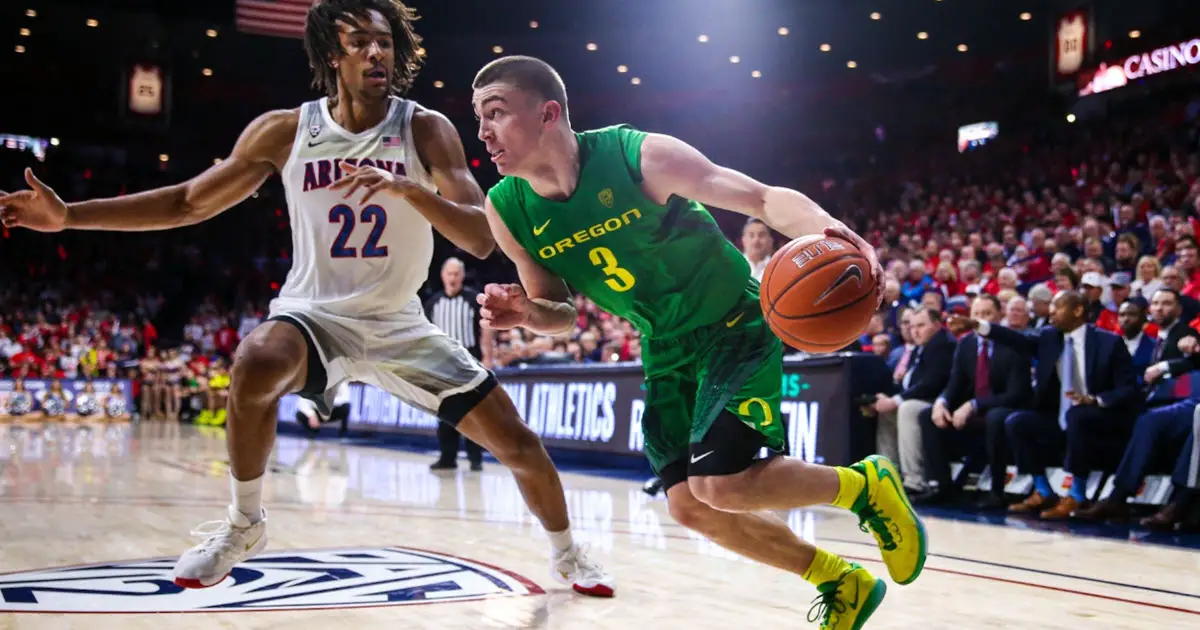With 21 wins, the Oregon Men’s Basketball team has essentially punched its ticket in to the NCAA tournament, and the Ducks might even have the best player in the country in Payton Pritchard. Despite these positives, the Ducks have a massive problem: they cannot put teams away.
The Ducks have consistently played to the level of their opponents this season, and it has resulted in a number of losses. With several extended periods of little to no scoring in multiple games, Oregon leaves the door open time and time again. If the Ducks aren’t careful, it is going to end their season early.
Oregon is only scoring 71.3 points per game in conference, versus 80.3 points per game out of conference. Below are a few things the Ducks can do to bring back their early season offensive success.
Attack the Wings

Chris Duarte should attack the rim from the wings more often.
Oregon has one of the best scorers in the country in Pritchard, but outside of the four-year starter, they struggle to score with any level of consistency. Despite averaging nearly 13 points per game, Chris Duarte disappears for long stretches of offense in every game. Will Richardson is much the same, averaging 10.7 points per game, and he occasionally doesn’t take part in the offense outside of the obligatory pass on the perimeter (more on that later).
Getting Duarte, Richardson and Anthony Mathis (7.9 ppg) more involved outside of shooting threes would go a long way toward getting the offense into a better rhythm. As the three players who play the most minutes on the wings, they should be attacking the basket more frequently.
Watching tape of Oregon’s losses this season, there is a common theme: teams attacking from the wings. The philosophy is simple; attack a player one-on-one, and either the defense collapses and leaves shooters open outside, or the defense doesn’t collapse and the offensive player can attempt to score at the rim — a play that would have a chance for a foul call on the defense.
When the Ducks rely too heavily on Pritchard to handle the ball, it results in the point guard wearing down over the course of the game and struggling to shoot the ball late. Having the wing players attack the basket would take a lot of pressure off Pritchard, allowing him to not have to be the sole initiator of the offense.
Move the Ball

Payton Pritchard is a great distributor, but other players are struggling to get involved.
The Oregon offense is fairly simple to figure out. Pritchard brings the ball up the court, passes to one of his wings moving toward the top of the key, who passes to the other wing moving toward the top of the key, who passes back to Pritchard, who makes it up from there.
There is no probing passes inside, no players distributing from the top of the key, and no driving from the wings as stated above. Pritchard usually calls for, and ignores, a screen from one of the big men, but rarely if ever uses the screen and the roller.
This is what has been dubbed “hero ball” and it is why the teams with the best players rarely ever win the NCAA Tournament. The lack of ball movement allows the defense to key in on the star player, and dare the team to beat the opposing team with anyone else. Unfortunately for the Ducks, a great three-point shooter only hits 40% of his shots, meaning that all the kickout threes by the wing players are, at most, getting a basket every other try.
Pritchard was blocked or stripped no fewer than three times in the second half against Arizona because the defense did not respect any other player on the floor, and Pritchard refused to pass out of drives. This led to Oregon falling behind by as many as seven points throughout the second half. While the Ducks did come back to win the game, they might’ve won in regulation had their ball movement been better.
Spread the Wealth

Shakur Juiston once scored 14 points per game over the course of a season, why can’t he do it again?
The two above points will naturally accomplish this final point, but it still needs to be said. Getting players other than Pritchard and whichever big man gets the most offensive rebounds involved is paramount moving forward.
In the first half against Arizona, Mathis had 11 points, in the second half and overtime he had no shot attempts. Duarte and Richardson combined for only six points. If not for Pritchard scoring a career-high 38 points, and Shakur Juiston getting an impressive 14 points, including all nine overtime points for Oregon, the Ducks would have lost by double digits.
A player that could provide the missing scoring punch is CJ Walker. The former five-star recruit has seen his minutes disappear over the last two weeks. With eight consecutive games scoring five or fewer points, Walker is clearly struggling on the offensive end.
Earlier in the season, however, Walker showed flashes of skill in the pick and roll, as well as a back door cutter. Getting Walker in these types of situations again could lead to an increase in scoring, as well as confidence from the true freshman.
How this Would Look
Early in the season, Oregon was doing all of the things listed above. For whatever reason, Dana Altman has moved away from them as the season has gone on, and his offense became more and more of the fast break, plus whatever Pritchard can get. If Altman is going to reach the Final Four with this roster, he needs to get the offense rolling again. With a team this talented, the Ducks should have no problem reigniting the offense across the board, and putting away teams they should beat easily.
Ryan Robertson
Yuma, ArizonaTop Photo Credit: Twitter
 Natalie Liebhaber, the FishDuck.com Volunteer Editor for this article, works in the financial technology industry in Bozeman, Montana.
Natalie Liebhaber, the FishDuck.com Volunteer Editor for this article, works in the financial technology industry in Bozeman, Montana.
Ryan Robertson is a defense contractor for the United States Marine Corps. A lifelong Duck fan from Grants Pass, he joined the Army out of high school. After four years as an Intelligence Analyst he decided it was time to further his education and pay more attention to his Ducks. One of Ryan’s first memories is of watching the Ducks, led by Joey Harrington, beating up on the Utah Utes in 2001. His grandfather ran track at Oregon in the ‘50s. He loves the Ducks, and has a passionate interest in reading every scrap of analysis centered around the football team.

